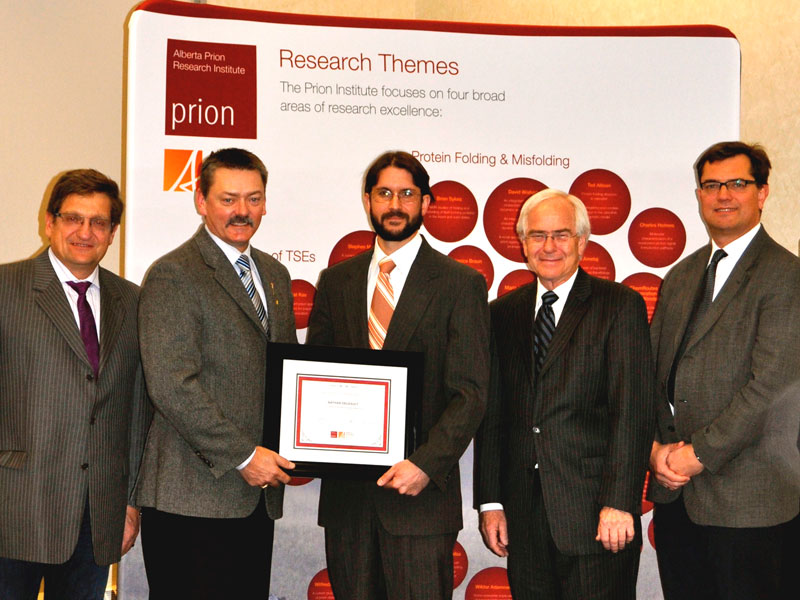
For Release: December 1, 2010
Contacts:
Rick Adams (603) 653-1913 clarence.r.adams@hitchcock.org
Lyanne Foster (780) 638-3789 lyanne.foster@albertainnovates.ca
Dartmouth Medical School researcher wins international prize for paper on prion research

Nathan Deleault, International Young Researcher Prize Winner (center) is flanked by officials from the Alberta Prion Research Institute and the government of Alberta at the award presentation November 24 in Edmonton.
To celebrate its fifth anniversary and promote work being done in prion and protein misfolding research, the Alberta Prion Research Institute is recognizing the work young researchers are accomplishing on the international scene. On November 24, Dartmouth Medical School research associate Nathan Deleault was awarded with the Alberta Prion Research Institute's International Young Researcher Prize.
"This prize shows the initiative Alberta is taking to find solutions to a serious global problem," said Doug Horner, Minister of Advanced Education and Technology. "It also highlights Alberta as an important hub in international prion research and helps strengthen our international relationships and collaboration."
Nathan Deleault's paper, "Formation of native prions from minimal components in vitro," was selected by an international jury as having the most innovative findings and anticipated future impact in the field of prion and prion-like protein misfolding science.
"The International Young Researcher Prize celebrates contributions made by outstanding young researchers, around the world, in this field of research. This prize is our way of showing Alberta's commitment to prion and protein misfolding research locally and internationally" said Stan Blade, CEO of Alberta Innovates - Bio Solutions.
Deleault started his prion work as a research technician is 2001, working with biochemist Surachai Supattapone, MD, PhD at Dartmouth Medical School. He earned a Master of Arts in Liberal Studies (MALS) degree from Dartmouth in 2007, and is currently pursuing a law degree at Vermont Law School.
Deleault's paper, published in the Proceedings of National Academy of Sciences, reports two major advances: That infectious prions can be produced spontaneously formed outside of cells. This provides an explanation for the longstanding paradox that prion diseases can arise sporadically in patients that were never exposed to infectious prions. Another finding was that infectious prions can be formed from a minimal cocktail of defined components.
That finding demonstrates that infectious prions do not contain coding nucleic acids or accessory proteins. Cofactors are necessary in prion formation in vitro, and this finding suggests they may also play an important structural role in maintaining the infectious properties of prions.
"Mr. Deleault's paper is significant, as it provides proof for a theory that has been postulated for more than a decade. The impact of this manuscript on the prion field has already been very strong - cited in many scientific papers, and our panel of international reviewers thought that the paper's impact will continue to grow in the future," said Dr. Kevin Keough, Executive Director of the Alberta Prion Research Institute.
There is prion and protein misfolding research being done around the world to help find solutions around diseases such as bovine spongiform encephalopathy (BSE, also known as mad cow disease). More than 130 Alberta student and young professionals have been supported, in the last five years, by the Alberta Prion Research Institute. Forty-five research projects have been funded, worth more than $30 million, to help find solutions to the serious scientific and socioeconomic challenges associated with prion and protein misfolding diseases.
The International Young Researcher prize is a celebration of the work of hundreds of up-and-coming researchers who are contributing to the collective knowledge in this field of science, those working towards creating the next generation of solutions.
The Alberta Prion Research Institute is a $35 million initiative, announced by the Alberta government in 2005, to support top researchers working on solutions to the serious scientific and socioeconomic challenges associated with prions and protein misfolding diseases. The Alberta Prion Research Institute is part of Alberta Innovates - Bio Solutions, the key component of the Government of Alberta's innovation framework that supports the agricultural, forestry and associated industries by setting strategic direction for research in Alberta.
-DMS-